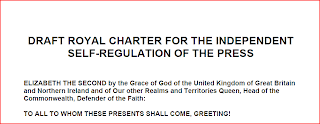 |
| Local newspaper seller in Birmingham (Pic: Jon Slattery) |
A trio of regional press editors have voiced their support for the new draft Royal Charter on press self-regulation published yesterday by the industry.
Interestingly, all three refer in a press release from the Newspaper Society to the new proposal as the "Independent Royal Charter."
Simon O’Neill, group editor of the Oxford Mail which covers David Cameron’s Witney constituency, said: “I support radical changes to the way Britain’s press is regulated, as I want no part of an industry that hacks phones and convicts innocent people on the front pages. But I will not accept a system that has been steamrollered through by self-interested politicians and pressure groups in the dead of night.
“The implications for press freedom in this country with politicians astride the regulation process hardly bear thinking about. Furthermore, I am disappointed, but not surprised, that despite fine words from MPs of all parties, including the three leaders, the impact this would have on the regional press has been completely ignored, or at best viewed as collateral damage. They clearly believed that if they patted us on the head we’d just go away. They were wrong.
“I want firm, fair and credible press regulation that also preserves freedom of the press in this country for another 300 years or more. That is why I support the Independent Royal Charter. It offers a sensible and effective solution to the current stalemate.”
Alastair Machray, Liverpool Echo editor and Trinity Mirror Merseyside, Cheshire and Wales editor-in-chief, said: “For me this the Independent Royal Charter is an excellent piece of work for three reasons: firstly it breaks what looked like deadlock; secondly it recognises that the regional newspaper industry is in no position to carry the huge financial risks inherent in the cross-party Royal Charter; and finally, crucially because it protects a freedom of the press that has served us brilliantly for 300 years.”
Nigel Pickover, Eastern Daily Press and Norwich Evening News editor-in-chief, said: “We believe the proposed system confronts the concerns of many press publishers and editors and is a boost to the process of implementing a tough new system of independent self regulation. It is an Independent Royal Charter which will guarantee Britain remains the home of free speech. It will deliver what Lord Leveson called for.
"Politicians must accept this compromise solution or they will be culpable in threatening not least a regional press which millions of people rely on for news that is clear, truthful and unhindered by the vested interests.”
- Backers of the draft Royal Charter are said to be very pleased with the reaction it has received, including what they see as "encouragement" from the FT, Guardian and Independent - the three national newspapers that have not yet formally signed-up to it.




















